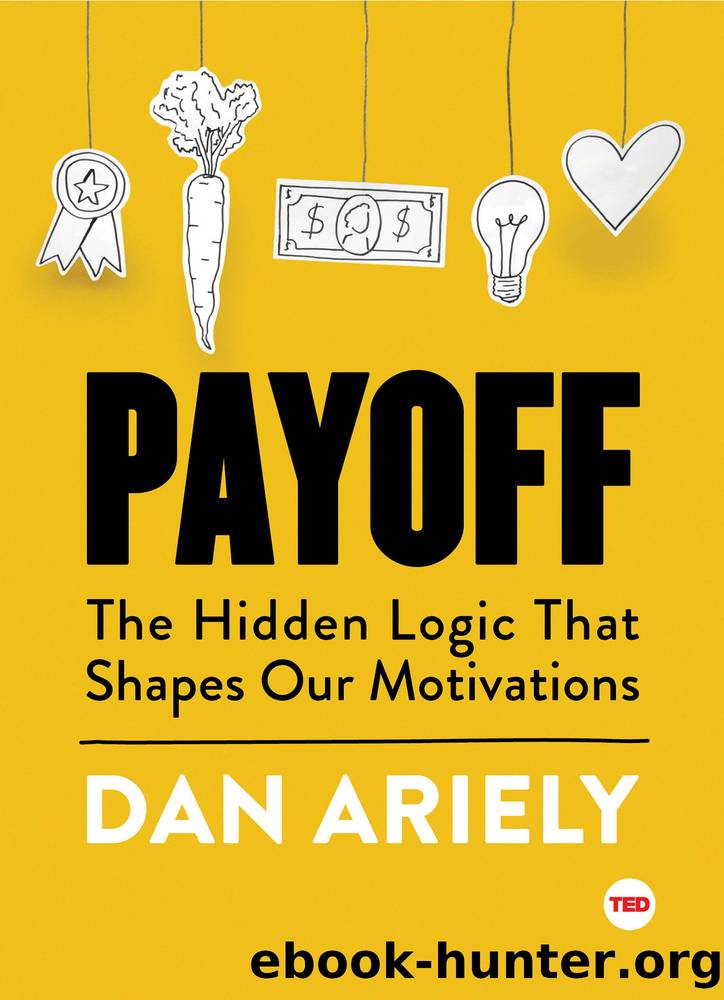Payoff by Dan Ariely

Author:Dan Ariely
Language: eng
Format: epub
Publisher: Simon & Schuster/ TED
An Experiment at Intel
Because the problem of determining the best way to motivate people is so vast and context dependent, there isnât (nor will there ever be) one experiment that would give us the one true answer to this question. Researchers can take only small steps in hopes of discovering how managers and policymakers can make slightly less damaging mistakes in their attempts to motivate people.
Quite a few years ago, Uri Gneezy (a professor at the University of San Diego California), George Loewenstein (a professor at Carnegie Mellon University), Nina Mazar (a professor at the University of Toronto), and I carried out some lab experiments on the effectiveness of large bonuses.13 One of our main findings was that when the bonus size became very large, performance decreased dramatically. This counterintuitive effect stemmed from the stress and fear of possibly not getting the bonus. But that was a lab result. And since the laboratory environment is inherently limited in its ability to capture the true, complex nature of labor, weâve spent years searching for ways to experiment with real employees at their workplaces. We wanted to study bonuses because almost all companies use some type of bonus, yet despite their ubiquityâand the fact that compensation is most businessesâ largest expenseâlittle is known about how effective bonuses really are. Even less is understood about what forms of payment work best. So understanding the effects of bonuses became our white whale.
When looking for a promising testing ground for experiments on motivation and performance, we thought about the types of jobs that would be best and worst to study. Defining the best jobs to study is complex, but we can probably agree that one of the worst types of job anyone could consider for this purpose is something like mine. Since Iâm a university professor, my productivity is hard to quantify. Does my employer measure my output by the number of papers I publish? The number of talks I give? The hours of teaching I put in? The number of good ideas I have? Itâs also difficult to measure the quality of my work. For example, is this book any good, and by whose standards? Nor is the link between motivation and output direct or clear. Sometimes I might be highly motivated to find a particular answer to a question, but the concept I am working on is not the right one. Sometimes I might not be terribly motivated, but I stumble on a good research topic. The challenges with measuring my productivity are not unique to professors; in fact, they are common to most knowledge workers. Your productivity is likely to be as complex, if not more so, than mine to measure.
To test the effectiveness of different motivations, we needed to study a work environment in which employee output could be easily and accurately measured and where the tasks were more or less constant.
I lucked out when Guy Hochman, then a Duke postdoctoral fellow, introduced me to Liad Bareket, who worked in the HR department at Intel in Israel.
Download
This site does not store any files on its server. We only index and link to content provided by other sites. Please contact the content providers to delete copyright contents if any and email us, we'll remove relevant links or contents immediately.
Tools of Titans by Timothy Ferriss(6938)
Change Your Questions, Change Your Life by Marilee Adams(6637)
Deep Work by Cal Newport(5452)
Man-made Catastrophes and Risk Information Concealment by Dmitry Chernov & Didier Sornette(4731)
Big Magic: Creative Living Beyond Fear by Elizabeth Gilbert(4719)
The Slight Edge by Jeff Olson(4716)
The Motivation Myth by Jeff Haden(4521)
Digital Minimalism by Cal Newport;(4512)
Stone's Rules by Roger Stone(4413)
Ego Is the Enemy by Ryan Holiday(3982)
The Laws of Human Nature by Robert Greene(3936)
Tuesdays with Morrie by Mitch Albom(3830)
Rising Strong by Brene Brown(3777)
Eat That Frog! by Brian Tracy(3509)
Skin in the Game by Nassim Nicholas Taleb(3456)
The Money Culture by Michael Lewis(3277)
Skin in the Game: Hidden Asymmetries in Daily Life by Nassim Nicholas Taleb(3259)
Believe It to Achieve It by Brian Tracy & Christina Stein(3201)
Bullshit Jobs by David Graeber(3173)
